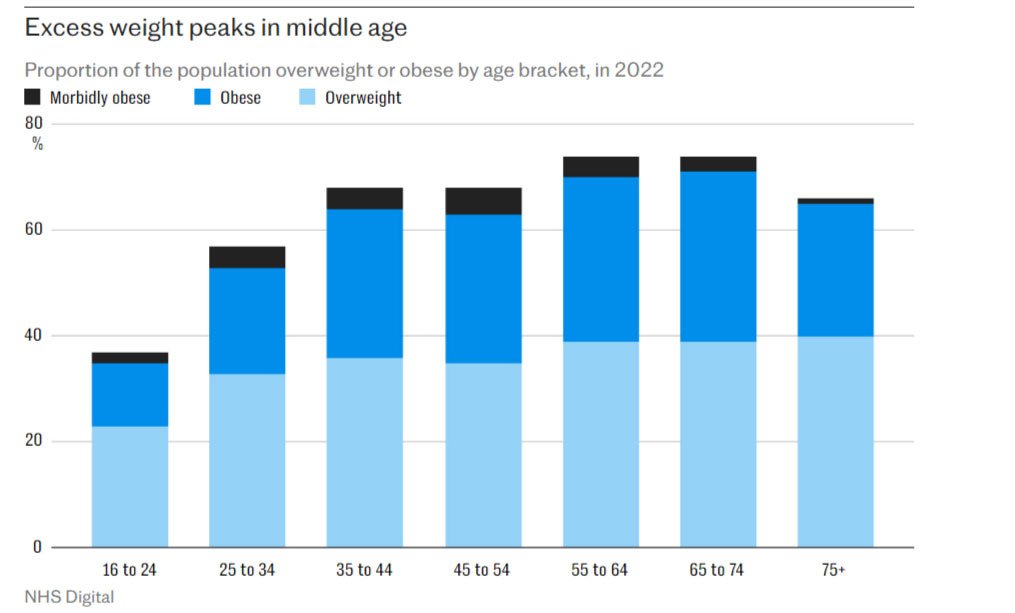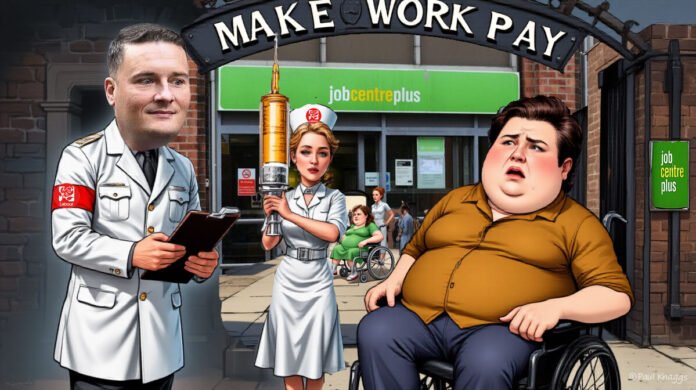A Bitter Pill to Swallow: Labour’s Dystopian ‘Make Work Pay’ Scheme
Is this what passes for progressive policy in 21st century Britain – doling out weight loss drugs to the unemployed? Have we truly sunk so low that we now seek to medicate away the symptoms of an unjust economic system rather than treat the disease itself?
Sir Keir Starmer’s Labour Party, once the stalwart champion of working people, has unveiled its latest masterstroke to solve Britain’s unemployment and productivity crisis: free weight-loss jabs for the jobless obese. You can almost hear the ghost of George Orwell cackling from beyond the grave, muttering “I told you so!”
Let us examine the twisted logic at play here. The government claims these drugs will help the unemployed “get back to work.” But where are these mythical jobs that apparently only thin people can perform? In an economy ravaged by austerity and deindustrialisation, with wages stagnant for decades, the problem isn’t the waistlines of workers – it’s the greed of the capitalist class.
Health Secretary Wes Streeting, with all the zeal of a snake oil salesman, proclaims in an opinion piece published in ‘The Telegraph’ speaking directly to the new bread of Labour supporters, that these “wonder drugs” will be “life-changing”, helping the unemployed shed pounds and slip effortlessly back into the workforce. How convenient that solving the obesity crisis might also pad the profit margins of pharmaceutical giants like Eli Lilly, who are set to invest a cool £279 million in the UK as part of this scheme.
Make no mistake, this proposal is not about health – it’s about control and profit. It’s about forcing the most vulnerable in our society to conform to an arbitrary standard of productivity, all while ignoring the structural inequalities that create poverty and poor health outcomes in the first place.
I’m reminded of George Orwell’s observations in “The Road to Wigan Pier” about the diet of the unemployed in 1930s Britain. He noted that cheap, starchy foods were often the only option for those living in poverty. Nearly a century later, we face the same issues – but instead of addressing food insecurity and economic inequality, Labour proposes to chemically suppress the appetites of the poor.

Some may argue this is a pragmatic solution to rising healthcare costs. But let’s be clear – the strain on the NHS comes not from the bodies of working people, but from decades of underfunding and creeping privatization. The same neoliberal policies that have hollowed out our public services are now being used to justify this Orwellian scheme.
“As a country, we’re eating more, eating less healthily and exercising less. The costs to the individual are clear – a less healthy and shorter life.”
Obesity policy specialist Dr Dolly van Tulleken said the idea was unrealistic as the eligible population for this plan was “in the millions” with specialist weight management services only able to treat 49,000 per year.
She said the policy idea of incentivising unemployed people who are obese, was not new, and had previously gone down “very badly”.
Speaking to the Today programme, she said the plans look at people based on “their potential economic value” rather than their needs.
Some weight loss medicines are already prescribed by the NHS. The medication which supresses appetite is sold under the brand names Wegovy – used to treat obesity – and Ozempic, for diabetes.
It comes in the form of an injection and mimics the hormone GLP-1, making people feel fuller and less hungry.
Experts have warned in the past that the drug is not a quick fix or a replacement for eating well and exercising, and should only be offered under medical supervision.
Former health minister Lord Bethell said the NHS would have to make “concrete steps to pivot to prevention so that we’re not simply medicalising the national obesity problem.”
We must ask ourselves – who truly benefits from this policy? Certainly not the unemployed, who will be subjected to potential side effects and the stigma of mandatory medication. No, the real winner here is the pharmaceutical industry. It’s no coincidence that this announcement comes alongside a massive investment from Eli Lilly. The revolving door between government and big pharma spins ever faster.
Labour’s Attempt to Medicate the Unemployed Away
This proposal is part of a disturbing trend of individualising social problems. Rather than tackle the systemic issues that lead to unemployment and poor health outcomes, it’s far easier to place the blame – and the burden of change – on individuals. It’s the same logic that leads to calls for “personal responsibility” in the face of climate change, ignoring the outsized role of corporations in environmental destruction.
Starmer’s Labour Party, once the stalwart defender of working people, has sunk so low that it now aims to medicate away the symptoms of an unjust economic system rather than addressing its root causes.
Instead of standing up to regulate the fats, sugars, and preservatives flooding our food supply, they offer injections as a cure-all—even for problems that are deeply systemic, not individual.
And what of personal responsibility, you ask? Oh, fear not – Streeting assures us that individuals must still take “healthy living more seriously.” How magnanimous of him to remind the plebs of their duty while simultaneously treating them like lab rats in a grand social experiment.
In the dystopian near-future of Starmer’s Britain, one can almost hear the gears of bureaucracy grinding: “Please log your weekly weight in your Universal Credit journal. Failure to meet your prescribed BMI target may result in benefit restrictions or mandatory ‘fat buster’ injections.”
Oh, we’re assured it’s all voluntary now, of course. But how long before the unemployed are coerced into compliance? One can imagine the scenes: queues of jobseekers lining up for their weigh-ins, like cattle at market. “Too fat for factory work, but just right for a desk job. Next!”
And what of the thin unemployed? Are they to be force-fed until they reach an “ideal working weight”? Perhaps Labour will introduce a new slogan: “Get Fit for Work!” Complete with mandatory gym memberships and state-sponsored protein shakes.

The absurdity would be comical if it weren’t so chilling. This isn’t community healthcare or preventative action. It’s social engineering masquerading as public health policy.
Let us not mince words – this is eugenics dressed up in the language of public health. It is an attempt to mould human bodies to fit the demands of capital, rather than creating an economy that serves human needs. It is, in short, utterly repugnant to anyone who believes in human dignity and social justice.
If Labour truly wants to “make work pay,” there are far more effective – and ethical – solutions at hand. A £15 minimum wage, as once promised, would be a start. Strengthening unions, investing in public services, and implementing an industrial strategy to create meaningful jobs – these are the policies that would truly improve lives and livelihoods.
If Labour want to tackle the obesity and diabetic problems plaguing the Western world then they must regulate the UK food industry…
But such measures would require challenging the power of the wealthy so-called elites who have benefited from decades of neoliberal policy. It seems Starmer’s Labour lacks the courage for such a fight, preferring instead to literally drug the unemployed into compliance.
David A Ricks, the chairman and chief executive of Lilly, said: “We welcome this opportunity to partner with the UK Government on tackling and preventing disease, and accelerating innovation to advance care delivery models.” I bet he does…
This, dear readers, is the brave new world of Labour under Starmer – a dystopian vision where the solution to societal ills is not to change the system, but to chemically alter the populace to better fit within it.
We stand at a crossroads. Will we continue down this path of dehumanisation and control, treating citizens as mere economic units to be optimised? Or will we rediscover the radical empathy and solidarity that once defined the labour movement?
The choice is ours. But make no mistake – a society that would rather medicate its unemployed than ensure economic justice for all is one teetering on the brink of moral collapse. We must resist this dystopian vision with every fibre of our being. The future of our democracy depends on it.
Support Independent Journalism Today
Our unwavering dedication is to provide you with unbiased news, diverse perspectives, and insightful opinions. We're on a mission to ensure that those in positions of power are held accountable for their actions, but we can't do it alone. Labour Heartlands is primarily funded by me, Paul Knaggs, and by the generous contributions of readers like you. Your donations keep us going and help us uphold the principles of independent journalism. Join us in our quest for truth, transparency, and accountability – donate today and be a part of our mission!
Like everyone else, we're facing challenges, and we need your help to stay online and continue providing crucial journalism. Every contribution, no matter how small, goes a long way in helping us thrive. By becoming one of our donors, you become a vital part of our mission to uncover the truth and uphold the values of democracy.
While we maintain our independence from political affiliations, we stand united against corruption, injustice, and the erosion of free speech, truth, and democracy. We believe in the power of accurate information in a democracy, and we consider facts non-negotiable.
Your support, no matter the amount, can make a significant impact. Together, we can make a difference and continue our journey toward a more informed and just society.
Thank you for supporting Labour Heartlands









